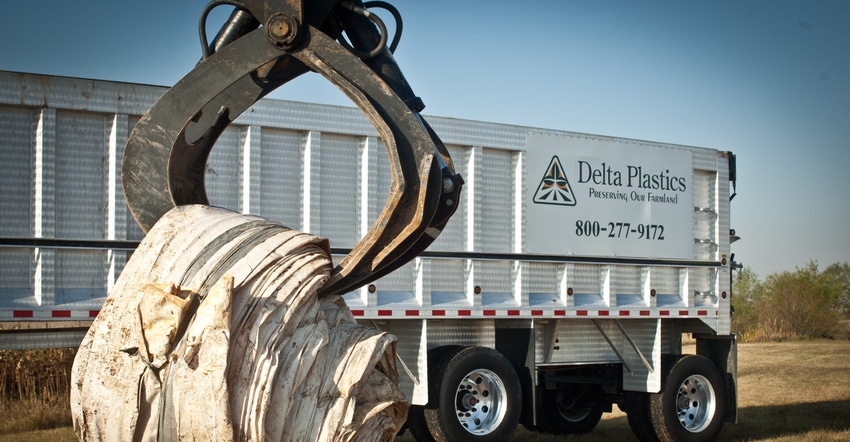Manufacturer/Recycler Revolution Gives Agriculture Waste a Second Life
The agricultural plastic films market will be worth about $16.10 billion by 2030, projects Market Research Future. Products made from these materials—from geomembrane films to control humidity, to greenhouse cover films, to polytube for irrigation –protect crops and can help boost production.

The agricultural plastic films market will be worth about $16.10 billion by 2030, projects Market Research Future. Products made from these materials—from geomembrane films to control humidity, to greenhouse cover films, to polytube for irrigation –protect crops and can help boost production.
But at the end of its life most of the material is stockpiled; burned in open fields, generating toxic air pollutants; or landfilled. Recycling options are scarce because film can be difficult to process. It’s lightweight and moves around on conveyor belts and gets caught in processing equipment. It tends to hold in moisture. And, in the case of agriculture films, soil contamination is a common barrier to producing clean new products.
Revolution, a manufacturer and recycler of plastics, is trying to put a dent in some of the wasted agriculture film pileup and put it to use, focusing mainly on recycling polytube that it supplies to farmers in the Mississippi Delta region. The low-density polyethylene (LDPE) piping provides irrigation to row crops and rice; it’s an inexpensive alternative to traditional hard piping used for overhead sprinklers.
At first, the company under its brand, Delta Plastics, only manufactured and sold polytube – then began collecting it from its clients as a service rather than leave them to deal with it at the end of its one-season lifespan.
“We realized quickly that if we could figure out how to recycle polytube and come up with a raw material feedstock source, that would be a great story from an environmental perspective, as well as from a profitability perspective. And we could gain a competitive advantage,” says Bret Dague, vice president of Agriculture for Revolution.
So, the company began investing in recycling equipment and a process and has spent the past 25 years refining that process, which involves a chemical-free, closed loop washing system (water is reused) and repelletization of the postconsumer resin (PCR).
The company takes back and recycles plastics from customers along its multiple business lines and sells the PCR back to companies and consumer brands with sustainability goals, as well as incorporates the material in its own inhouse products: industrial trash can liners, carry out bags for restaurants, and retail shopping bags.
Over 150 million pounds of agriculture film are collected and processed a year, largely from spent polytube.
The company’s fleet of trucks, equipped with knuckle cranes and other specialized collection equipment, pick up the retired irrigation piping from farms and deliver it to Revolution’s Stuttgart, Ark. recycling facility. Streamlining this logistics piece of the puzzle has proven a hard job as each farmer pulls polytube off the field on its own schedule.
“We would send trucks and they may or may not come back full. Or we may spend longer hours out, driving more miles [to fill trucks], which is more wear and tear on the vehicles, more fuel, and more emissions,” Dague says.
Working with its brand, Delta Plastics, Revolution has since developed technology to improve the efficiency of its dispatch process, while offering perks to farmers.
Branded as Push for Pick Up & Get Paid, it’s an app enabling farmers to schedule pickups. They get a $10 rebate per tube, which they can redeem at the dealer of their choice to buy whatever supplies they need.
The program is intended to drive value back to farmers by taking care of their waste and give them a monetary bonus while bringing repeat business to the dealers.
The payback for Revolution, Dague says, will be the ability to cut its carbon footprint and better plan collections.
“We know when to send trucks out; we know the exact routes and what size piles to expect … We just launched early this summer. So, we are very much on the front end, and the outcome is yet to be seen. But we think it will be meaningful,” he says.
So far there are 1,000 sign ups, but the season is just wrapping up with a lot of the polytube of these first-comers still in use.
Trey Reaper, who runs a small farming operation in Searcy, Ark., has had Revolution pick up his polytube for years. Prior to that he stockpiled it on his property.
“It made quite a mess, and we were very glad they implemented a pickup program. It’s convenient and a huge time saver as we just pile it up and let them know it’s ready for pick up. We value aesthetics as many growers do, so having a company willing to dispose of unsightly rolls is great for us,” he says.
The new app has been a bonus in Reaper’s eyes.
“I no longer have to call it in for a scheduled pick up. Everything is in a few clicks. It’s easy, efficient, and provides a way for us to check a box and move on to the next task.”
Push for Pick Up follows on Revolution’s software application: Pipe Planner. Leveraging Google maps, it was developed to help farmers plan placement and specs for polytube and ultimately improve efficiency for irrigation and reduce water waste.
Says Dague of the company that started out in agricultural plastics manufacturing, expanded into several vertical markets, recycling, and later dabbling in technology: “This is not the end for us. We want to continue to challenge ourselves and add value for users of our plastics whether through technology or other services. We want to make sure we are driving that value to continue growing our sustainability story.”
About the Author(s)
You May Also Like




